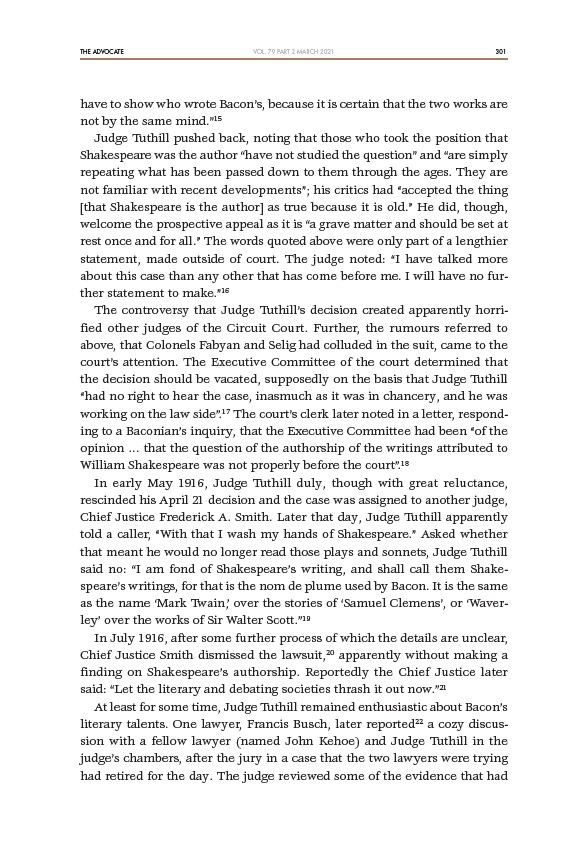
THE ADVOCATE 301
VOL. 79 PART 2 MARCH 2021
have to show who wrote Bacon’s, because it is certain that the two works are
not by the same mind.”15
Judge Tuthill pushed back, noting that those who took the position that
Shakespeare was the author “have not studied the question” and “are simply
repeating what has been passed down to them through the ages. They are
not familiar with recent developments”; his critics had “accepted the thing
that Shakespeare is the author as true because it is old.” He did, though,
welcome the prospective appeal as it is “a grave matter and should be set at
rest once and for all.” The words quoted above were only part of a lengthier
statement, made outside of court. The judge noted: “I have talked more
about this case than any other that has come before me. I will have no further
statement to make.”16
The controversy that Judge Tuthill’s decision created apparently horrified
other judges of the Circuit Court. Further, the rumours referred to
above, that Colonels Fabyan and Selig had colluded in the suit, came to the
court’s attention. The Executive Committee of the court determined that
the decision should be vacated, supposedly on the basis that Judge Tuthill
“had no right to hear the case, inasmuch as it was in chancery, and he was
working on the law side”.17 The court’s clerk later noted in a letter, responding
to a Baconian’s inquiry, that the Executive Committee had been “of the
opinion … that the question of the authorship of the writings attributed to
William Shakespeare was not properly before the court”.18
In early May 1916, Judge Tuthill duly, though with great reluctance,
rescinded his April 21 decision and the case was assigned to another judge,
Chief Justice Frederick A. Smith. Later that day, Judge Tuthill apparently
told a caller, “With that I wash my hands of Shakespeare.” Asked whether
that meant he would no longer read those plays and sonnets, Judge Tuthill
said no: “I am fond of Shakespeare’s writing, and shall call them Shakespeare’s
writings, for that is the nom de plume used by Bacon. It is the same
as the name ‘Mark Twain,’ over the stories of ‘Samuel Clemens’, or ‘Waverley’
over the works of Sir Walter Scott.”19
In July 1916, after some further process of which the details are unclear,
Chief Justice Smith dismissed the lawsuit,20 apparently without making a
finding on Shakespeare’s authorship. Reportedly the Chief Justice later
said: “Let the literary and debating societies thrash it out now.”21
At least for some time, Judge Tuthill remained enthusiastic about Bacon’s
literary talents. One lawyer, Francis Busch, later reported22 a cozy discussion
with a fellow lawyer (named John Kehoe) and Judge Tuthill in the
judge’s chambers, after the jury in a case that the two lawyers were trying
had retired for the day. The judge reviewed some of the evidence that had